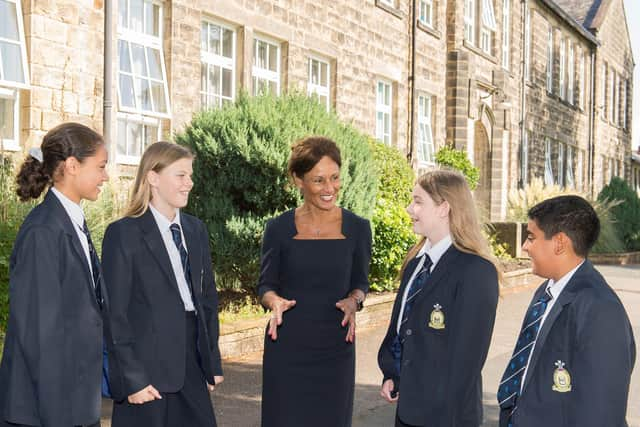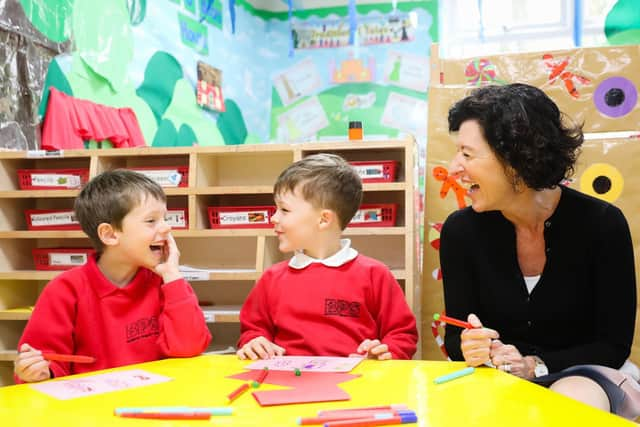Schools in Leeds deciding their own destiny by opting out of council control
and live on Freeview channel 276
The Collaborative Learning Trust was formed in September 2018 with Prince Henry's Grammar School at Otley at the helm. It was joined by Bramhope Primary School in 2019, which it already had a working partnership with, and then Hunslet St Mary's C of E Primary School (now St Mary's C of E Academy) in February 2020 after it was deemed inadequate by Ofsted.
There are many differences between the three schools from age range to social and demographic background - as well as current standings with Ofsted - but Janet Sheriff, chief executive officer at the Trust as well as the headteacher at Prince Henry’s, says school leaders have a "moral responsibility" to work together to deliver a good education.
Advertisement
Hide AdAdvertisement
Hide AdIt comes after Gavin Williamson, the secretary of state for education, said last week that it is the government's vision for more state schools to become academies.


However, while Prince Henry's and its partner schools back this, they are opting for a scaled down local model rather than a nationwide trust with a 'one size fits all' approach.
Ms Sheriff said: "When we set up the Trust we always had the ambition that we would work with other schools outside the partnership. We had something good to offer in terms of the way that we approach education and the success that we have had with that. Our governors and trustees see it as a moral responsibility to get schools together to draw on each other's strengths and support students in all of the schools.
"We want to develop a multi-academy trust to put in place more formal partnerships and ensure they are there in the future, not determined by the individuals working in the school at the time. We see this as an effective model in bringing about school improvement on a wider basis."


Advertisement
Hide AdAdvertisement
Hide AdThe Collaborative Learning Trust has it written in its constitution that it will welcome church schools and ideally would like to be made up of two or three secondary schools and more primary schools, but also will limit its partnerships to schools within the local region.
Ms Sheriff explained: "We don't want to become one of the huge trusts that work across different regions. Our ambition is to work in schools in our region, that is so we can genuinely be in collaborative partnership together."
The vision for forming the trust started three years ago and well before Mr Williamson outlined his vision at the Confederation of Schools Trusts conference. The idea is to give schools more control over funding and where it invests its resources, more freedom and creativity to work to a curriculum that, while it has to be as good as the national one, meets the needs of the community each individual school serves - and recognises that each school has its own challenges, needs and autonomy.
She added: "When we were looking Prince Henry's and whether to convert, we were looking at changes on the horizon in education, what's the right thing for our school and how can we navigate changes to make sure Prince Henry's is well-positioned to continue into the future, developing sustainable, high quality education.
Advertisement
Hide AdAdvertisement
Hide Ad"Recognising the autonomy of every school is really important. We need to recognise the individual challenges and contexts. Good education is good education, everybody deserves that whether you are in Hunslet, Otley or Bramphope. What we have in the trust is that common vision for education and common values, they are the things that hold us together and how we approach solutions."
Primary schools leaving local authority control to join academy trusts is less common than secondaries, and in Leeds particularly, says the headteacher at Bramhope who found herself working in isolation.
Rachel Colbourn told the Yorkshire Evening Post: "We are Ofsted rated outstanding so had no reason to join other than for the benefits. What could I do as a single headteacher working on my own and what could that look like sharing aspects of school life? The freedom was attractive and how we could work more effectively with the quality of support we do not get from local authorities."
Bramhope, as do the other schools, now have a team which sorts finances, HR and maintenance which were all things that previously fell to the headteacher to do and increasingly took them away from focusing on the school, pupils and education.
Advertisement
Hide AdAdvertisement
Hide AdMrs Colbourn said: "It was a disproportionate part of the day and becoming more so. Leeds is a big authority and a complex organisation and you are looking at what a whole variety of schools are doing rather than what your school needs. Bramhope, because it is oustanding, was left alone by the Department for Education but we needed sustainability and someone to work with us in an effective way.
"More schools will follow. They know local authority support is diminishing, they have a small team for a large number of schools and people are more conscious of how they spend budgets, value for money and the best things for the children."
